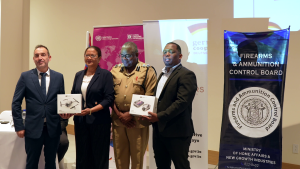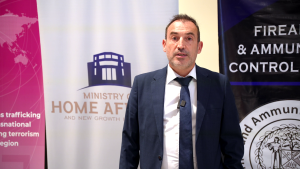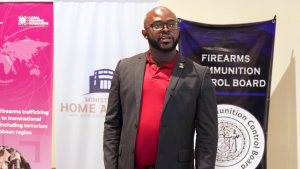Belize Boosts Firearm Fight with Drones and Training
Belize is stepping up its efforts in the fight against illegal firearms trafficking. The Ministry of Home Affairs and New Growth Industries hosted a national workshop aimed at improving how local and regional law enforcement agencies coordinate firearm-related investigations. They brought together representatives from the Belize Police Department, the Belize Defense Force, Customs and Excise, and the National Forensic Science Services. The three-day training, supported by the United Nations Office on Drugs and Crime and CARICOM IMPACS brought together security and forensic experts from across the country. As part of its support, the UN also donated two high-tech drones to enhance surveillance and border monitoring capabilities. Here’s Tanya Arceo with the following story.
 Tanya Arceo, Reporting
Tanya Arceo, Reporting
Belize is turning up the heat on illegal gun trafficking. Authorities just wrapped up a high-impact workshop focused on sharpening investigative skills and boosting teamwork across key agencies. Held at the Lord Ashcroft Centre, the sessions were led by the United Nations Office on Drugs and Crime, in partnership with CARICOM IMPACS and the Ministry of Home Affairs. The three-day training brought together police, BDF, customs, and forensic experts, all working to crack down on the flow of illegal firearms across the Caribbean. One key focus was improving how agencies link a single firearm to multiple investigations.

Roberto Rodriguez Codesal
Roberto Rodriguez Codesal, UNODC Representative
“Under the Caribbean roadmap and with fans from the German authorities we are conducting and providing different technical assistance to different countries and in this case, we have moved to Belize to deliver certain assistance. The first one is the donation of drones that we believe we will support the capacities of the country to detect and to also investigate firearms crime, we understand the difficulties of conducting certain surveillance and investigations and we believe that these drones can certainly help Belize”
CARICOM IMPACS analyst Kaj Cassells played a central role, helping participants understand the broader trends driving gun trafficking in the region. His presentations emphasized the need for unified systems, intelligence sharing, and modern investigative strategies to intercept firearms before they reach the streets.

Kaj Cassells
Kaj Cassells, Analyst, CARICOM IMPACS
“The situation is more dire for small developing states like Belize which face unique vulnerabilities due to limited resources, poorest borders and exposure to transnational criminal networks. That is why the establishment of an integrated firearms is not just timely it is essential. Now CARICOM impacts continues to support Belize in this comprehensive and sustained effort as we continue to build capacity through training of law enforcement, border, security agents, prosecutors and custom personnel to improve their investigative and intelligence capabilities.”
 Chief Executive Officer in the Ministry of Home Affairs, Sharole Carr, highlighted the importance of inter-agency coordination and traceability. She also welcomed UNODC’s donation of drones, noting that enhanced technology and collaboration are key to disrupting the illegal firearms trade and securing national borders.
Chief Executive Officer in the Ministry of Home Affairs, Sharole Carr, highlighted the importance of inter-agency coordination and traceability. She also welcomed UNODC’s donation of drones, noting that enhanced technology and collaboration are key to disrupting the illegal firearms trade and securing national borders.

Sharole Carr
Sharole Carr, C.E.O., Ministry of Home Affairs
“Today marks a pivotal moment in our collective effort to tackle transnational organized crime as you are very well aware, the illegal trafficking of firearms fuels violence, weakens institutions and endangers the safety and well being of citizens. In Belize, we have witnessed the devastating consequences of unregulated firearms, from the destabilization of communities to the erosion of public trust in our security institutions. This is why the government of Belize through the Firearms and ammunition Control Board of the Ministry of Home Affairs and New Growth Industries, is committed to modernizing our firearm management systems and aligning our national strategies with international best practices”
A highlight of the week was the official handover of two DJI Mini 4 Pro drones to the Ministry of Home Affairs. Donated by UNODC through its Global Firearms Programme, the drones are expected to boost operational surveillance at key border points. The course also tackled modern challenges, like 3D-printed guns and online arms deals, with practical simulations and AI-based detection tools enhancing their expertise. Tanya Arceo for News Five.






Facebook Comments